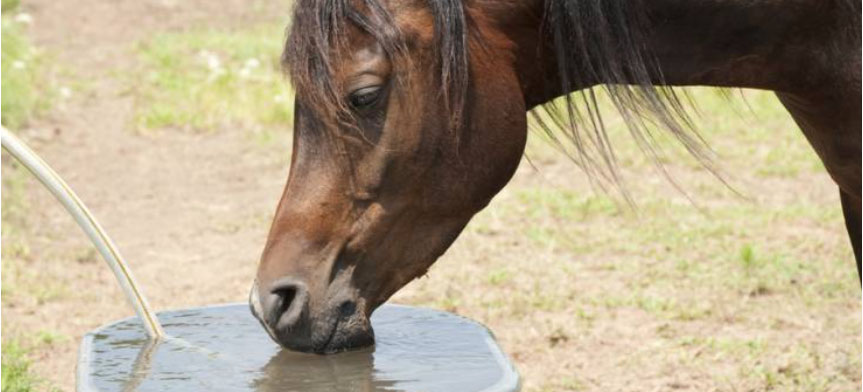
by Kentucky Equine Research Staff
As horse owners, we know well the importance of providing horses with water. Consider these six facts about water the next time you’re scrubbing buckets or waiting for the trough to fill.
1. Not surprisingly, water consumption depends on body weight. Expect a Belgian to outdrink a Haflinger any day of the week. Oddly enough, though, horses of similar body weight and breed may have completely different, though normal, intakes. What’s normal, you ask? Idle horses in a moderate climate will drink 5-15 gallons (20-55 liters) of water daily.
2. Just because your old mare drank two buckets of water yesterday and the day before that doesn’t mean she’ll drink two today. Variations in water intake for individual horses may occur from day to day. Keep track of water consumption as best as you can, and alert a veterinarian if your horse seems to drink little or no water.
3. Without question, diet affects water consumption. Horses grazing lush pasture grasses, which are high in moisture content, will drink less water than those faced with a pile of hay. In fact, horses that consume all-hay diets drink more water than those fed mixed hay-grain diets.
4. Drinking doesn’t take up a lot of your horse’s day. Researchers calculated that well-fed mature horses spend only five or six minutes a day drinking water, though this is achieved in several visits to the water source.
5. Do foals drink water, or do their dams provide adequate fluid until weaning? If you’re a breeder, you’ve seen foals hit the waterer as early as a week old. In one study, one-month-old foals drank nearly a gallon of water in addition to more than four gallons of milk daily.
6. Depending on environmental conditions and work intensity, exercising horses may require more water than their sedentary peers, especially if they sweat. Horses that sweat daily should be given electrolytes to help replace mineral losses in sweat. Research-proven supplements like Restore SR and Race Recovery provide the best electrolyte therapy.
Providing fresh, clean water to horses at all times remains a basic principle of horsemanship.
Reprinted courtesy of Kentucky Equine Research. Kentucky Equine Research is an international equine nutrition, research, and consultation company serving horse owners and the feed industry. Our goals are to advance the industry's knowledge of equine nutrition and exercise physiology, apply that knowledge to produce healthier, more athletic horses, and support the nutritional care of all horses throughout their lives. Learn more at Kentucky Equine Research.
There a more informative articles in our section on Health & Education. While you're here be sure to visit our Curated Amazon Store.

































